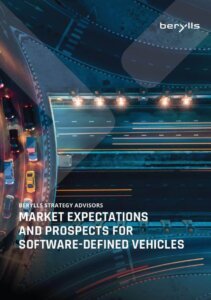ES 2022 has just showcased why this year will see the EV transition gather pace, says Berylls’ Martin French
You can’t beat actually seeing and touching the latest products for proof that consumer and automotive technologies are converging at speed. My tour of the floor at the latest CES 2022, held in Las Vegas earlier this month, brought home just how rapidly this blurring of boundaries is driving the automobility industry into new, exciting territory.
Despite some high-profile vendor pull-outs due to Covid-19, the show still offered plenty of its famous pre-pandemic razzmatazz. Among that, three main themes for the auto industry stood out for me, offering plenty of pointers about trends to watch in the year ahead.
Partnerships are coming to the fore in vehicle software development, as OEMs balance the trade-off between internal development and building external networks with companies that already have the core competencies they need. CES 2022 offered real-life examples in abundance.
Consider the news that Stellantis will collaborate to develop cars and trucks with Amazon’s STLA Smart Cockpit software in the dashboards. Meanwhile, Amazon will deploy “a significant number” of Ram ProMaster electric vans on Amazon’s delivery network, according to Stellantis’s CEO Carlos Tavares.
Amazon’s hook-up with Stellantis is clearly a sign of its efforts to get more traction in the transportation industry by adding a back-up to its minority stake in the California EV maker Rivian. As for Stellantis, this partnership could help it close the gap when it comes to developing vehicles with more sophisticated, software-powered infotainment and other connected vehicle technology.
Meanwhile, Intel’s self-driving systems subsidiary Mobileye announced plans to work with Geely’s Zeekr electric vehicle brand to launch an EV, an operating system and an EV solutions brand in China, Geely’s home market. The new EV will have level 4 autonomy and will use six of Mobileye’s “EyeQ5” chips, as well as employing Mobileye’s road-mapping data. Mobileye’s own eyes are not just focused on China. At CES 2022, it also committed to deepening its relationship with Ford and VW, both of which will use elements of Mobileye’s road-mapping data technology.
Last but not least, Volvo and the US self-driving sensor maker Luminar Technologies unveiled a hands-free driving system called “Ride Pilot”, due to be trialed soon in California, before featuring in a new all-electric SUV later this year. Ride Pilot will also be offered as a subscription upgrade for existing vehicles that go on sale from 2023, underlining Volvo’s belief that a large portion of future revenue will come from software.

Concept cars are always among the highlights of traditional auto shows, and some of the vehicles that caught my attention at CES 2022 offered good indicators of where the EV market is heading.
Showcasing its Airflow EV Concept, Chrysler announced that the brand will be all-electric by 2028. Chrysler has just received a massive new lease of life, after years of playing second and third fiddle to other Stellantis subsidiaries in the US, namely Jeep and Ram.
The OEM has got the message that having an all-electric brand offers a level of flexibility for the rest of the portfolio. As for the other brands in the Stellantis stable, Berylls’ expects to see all-electric Jeeps and RAM pick-ups soon, delivering more flexibility in the powertrains on offer for these vehicles.
Sony Mobility’s good-looking concept car, the Sony VISION-S 02 SUV, leverages the tech giant’s global scale and deep experience in consumer electronics. Yet it is one thing to have the know-how and vision to design an electric SUV, quite another to develop and manufacture it, as Tesla’s gruelling experience a few years ago and Rivian’s problems in 2021 demonstrate. Launching EVs can be a brutal drain on manufacturing and financial resources. If Sony enters the EV market in earnest, we expect it to join forces with a Tier 0.5 supplier with experience of manufacturing for tech companies that are new to automotive R&D and production.
Hot on the heels of last year’s electric vertical takeoff and landing (EVTOL) concept vehicle, Cadillac brought its InnerSpace concept car to the 2022 show. It was a refreshing confirmation that there’s still room for a sleek EV two-seater, in an automobility world dominated by SUVs, trucks and pod cars. InnerSpace is Cadillac’s take on what it thinks personal, self-driving mobility will look like in the coming decades – in essence, a visually impressive, luxury lounge on wheels.
Chevrolet also had a very interesting new vehicle to reveal at the show – its Silverado electric SUV, with a high-level trim and 650-plus horsepower. It won’t grace customers’ driveways until 2023 – but that will give them extra time to save for the $105,000 price tag! Chevy also announced two more electric SUVs, the Blazer and the Equinox, and GM’s CEO Mary Barra said the company is targeting a $30,000 starting price for the Equinox. If that happens, then it could be a real game changer in terms of kick-starting mass EV adoption in the USA, via an already-popular model of SUV.
CES 2022 came hot on the heels of the Biden administration’s decision to make accelerating EV adoption an official US government priority. At the show, three of America’s most renowned companies – GM, Walmart and John Deere – put their weight behind the proposition that the humble commercial delivery van and tractors are also ready for the electric revolution.
The GM-owned tech start-up BrightDrop announced that Walmart has signed up for 5,000 of BrightDrop’s EV600 and smaller EV410 electric vans to support the retailer’s growing last-mile delivery network. It’s all part of Walmart’s goal to operate a zero-emissions fleet by 2040. Meanwhile, BrightDrop is also expanding its relationship with FedEx.

Out on the farm – or rather, the CES 2000 parking lot – I certainly wasn’t expecting to see an autonomous tractor in the middle of all the glitz in Las Vegas. Never mind its farming capabilities, this huge beast is a tech geek’s paradise. Even before including the self-driving capabilities, John Deere says one of its typical e-tractors has more than 300 sensors and 140 controllers, and can process 15,000 measurements per second per machine. The self-driving technology adds on six stereo cameras, 360-degree obstacle detection, AI and machine learning capabilities, plus real-time data sharing for remote monitoring and management.
Full disclosure: Berylls recently invested in the Austrian software startup Kontrol, which has developed technology to ensure that autonomous driving systems comply with national regulations worldwide. So I was interested to find out more about other start-ups on show in Las Vegas, which address the key connected, autonomous and EV industry challenges.
One of the most interesting was Voltaiq, a California battery software intelligence start-up. The company’s Enterprise Battery Intelligence (EBI) platform gathers data from batteries and translates it back to the OEM and/or battery manufacturers in a way that makes it easy for them to troubleshoot for health issues. The platform can also perform random checks on battery systems being delivered by suppliers. Voltaiq’s aim is to work with the next generation of EVs to avoid mass battery and vehicle recalls.
Even with all of the new technology and new BEV products coming our way in 2022, a lot of consumers still want to see, feel and test before they buy. That’s why this year’s CES was especially worthwhile, after the virtual events that Covid has forced on the industry. Following Las Vegas, I’m looking forward to attending some of the rescheduled in-person events and moderating the panels on startups and VC, and I look forward to sharing the insights from those discussions with you.
Martin French - Why CES in person is worth the effort
Martin French has over 20 years of experience in automotive OEM and tier 1 suppliers with various high-profile international leadership, product development, operational, program management, strategic & business development roles. In 2012, after holding various senior management positions, he was appointed Global Vice President Customer Group at Webasto where he led the global business transformation for their US based customers.
Martin joined Berylls Strategy Advisors as Managing Director in 2019 and leads the Berylls office in Detroit, USA. His consulting focus is Automotive Suppliers & OEMs, Corporate Strategy & Business models, M&A, Restructuring & New Business Development.
Martin studied Production & Mechanical Engineering at Oxford Brookes University. He has lived in Michigan, USA, since 2012.